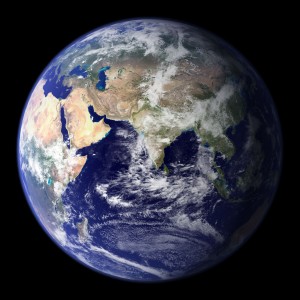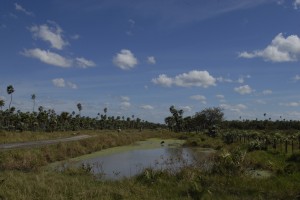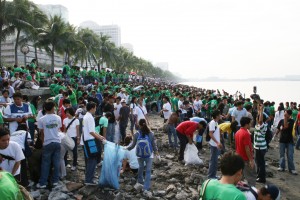May 3, 2012
Yeosu, Korea –
Dr. Moon spoke at the volunteerism forum at the 2012 Yeosu Expo. The forum was focused on the theme “Conservation and Regeneration of the Marine Environment.” This is the first of four posts with key themes from his address.
Stewardship Towards the Ocean
 We are moving into an “oceanic era” in which our stewardship of the environment and especially of marine resources, as well as better geo-economic cooperation of trade and travel routes, can lead to greater international prosperity and exchange.
We are moving into an “oceanic era” in which our stewardship of the environment and especially of marine resources, as well as better geo-economic cooperation of trade and travel routes, can lead to greater international prosperity and exchange.
As an avid outdoorsman with a deep appreciation for the natural world, I am keenly aware of the importance of the oceans and marine resources. We all know that life itself cannot be sustained without water. Oceans cover 71% of the earth’s surface, and encompass 97% of the earth’s water. Marine ecosystems are remarkably rich in biodiversity, and our oceans can be a tremendous food and energy source for the burgeoning global population. Already fish is the largest source of wild or domestic protein in the world, and the total commercial fisheries harvest exceeds 85 million metric tons annually. In addition, the oceans hold some of the largest reserves of currently used sources of energy such as natural gas as well as bio and fossil fuels.
Not only are the oceans a vital source of sustenance, we also know the oceans have a significant impact on climate and weather patterns. Oceans hold tremendous potential as the source of renewable energy: tides could be harnessed as a clean and inexhaustible energy source; waves, wind and currents could also utilized; and the ocean surface is itself an enormous solar energy collector. In short, the oceans comprise the largest powerhouse on our planet. In addition, by some estimates, 90% of international trade is transported by ship through the world’s waterways. In today’s globalized economy, with total population now exceeding 7 billion, and increasing demand for food and energy resources, it is clear that our oceans hold the keys to resource innovation and sustainability for the foreseeable future.
Economic development and technological advances have led to dramatic improvements in standards of living around the world. At the same time, however, rapid growth has placed significant and ever-increasing pressure on the environment. The global population is predicted to exceed 9 billion by 2050, yet according to UN statistics, the percent of arable land (fit for cultivation) continues to shrink. Undoubtedly water resources and food security will be issues of increasing concern with every passing year. Clearly the oceans are the shared heritage of all people, and the hope for the future of humanity. Thus it is imperative that we institute proper stewardship and management over these vital marine resources. We must commit ourselves to higher standards and a new approach if we are to seize the opportunity for a better future in the emerging oceanic era.
Paradigm Shift toward Social Development Involving Environmental Sustainability
As you may know, “sustainable development” has become a major focus of the United Nations and other global development entities. In the past, economic development strategies often did not adequately address issues of social development and environmental conservation. New models based on a sustainable development approach such as “green economy” represent a paradigm shift in development from isolated economic growth to a more balanced and comprehensive perspective of social development involving environmental sustainability.
The UN’s “Sustainable Development Goals” for 2030 addresses topics of water, energy, sustainable cities, oceans and small island developing states, natural disasters, climate change, forest, biodiversity and desertification, mountains, chemicals and waste, and sustainable consumption and production. In addition, United Nations Convention on the Law of the Sea establishes that we should rationally develop the ocean while likewise preserving the marine environment. This is the key to effective ocean governance: we must preserve the marine environment while developing the productive capacities of the oceans.
In my view, it is very significant that we are gathered here at this special forum on “The Conservation and Regeneration of the Marine Environment” at this Yeosu World Expo. The fact that the ocean is the selected theme of this major world convocation illustrates the growing priority of sustaining our vital marine resources. Together we can develop innovative and multidimensional strategies with the appropriate balance of economic development, environmental conservation, and improving social well-being.
Moral and Innovative Leadership for the Oceanic Era
I have often stressed that what is needed in our world today is moral and innovative leadership. The oceanic era should be motivated by a concern for the greater good. Thus, here too the need for moral and innovative leadership is crucial.
Moral leadership is guided by the shared principles and values that manifest in the noble qualities of human nature. In the context of the oceanic era, moral leadership affirms the intrinsic value of every person, regardless of ethnicity, nation of origin, or station in life. This natural world is our common home, a blessing to all people for our mutual benefit. Therefore it is our shared responsibility to care for our environment, use resources in wise and sustainable ways, and conserve the bounty of nature for the well-being of present and future generations.
When we live in accordance with universal laws and in harmony with the natural world, we can best tap the resourceful energy of human creativity. Innovative leadership focuses that energy to find new and inventive approaches to solve problems and create new opportunities.
In the oceanic era, that creative focus can help us as we explore the new frontier of the world’s oceans, and unlock the great potential of the vast expanses there. Likewise responsible action coupled with innovative problem-solving must be employed in renewing coastal wetlands and other marine ecosystems, as well as in protecting the natural balances in the oceans that impact weather patterns and climate.
In today’s highly interconnected world and global economy, it is vitally important that well-being and prosperity are available to people everywhere. Thus the oceans and sea routes should be open to the benefit of all, allowing for the free flow of trade and commerce. The oceanic era should be motivated by a concern for the greater good, and thus maritime disputes and conflicting claims to territorial waters must be solved through diplomatic, legal and hence peaceful means.
Leadership that considers the concerns of the entire human family, and that encourages “win-win” approaches to problem-solving, can best promote a higher quality of life for all, and the lay the groundwork for sustainable peace.
Global Volunteerism
I firmly believe in the transformative power of service. That is why I consider it vitally important to promote volunteerism in the oceanic era.
I applaud and strongly encourage sea development programs and global volunteer opportunities such as those offered through Service For Peace.
The oceans are an essential component of this Earth which is our common home. Through service initiatives we can experience a deeper appreciation for our environment. As we build a culture of service, we will also be creating a culture in harmony with the natural world, wisely using and caring for our resources of the land, sea, and air. With such a culture, we can implement effective strategies of oceanic governance, engaging all sectors in public-private partnerships for the common good.
I have seen the power of committed people joining together in common cause, we are confident that together we can resolve the global need to preserve the marine ecosystem. I am certain that our focus on this issue will spread as a wave of international volunteer spirit just like dandelion seeds. When people everywhere become aware of this issue and make even small changes in their lifestyle, it will be a big step towards sustainable development that allows us to care for and live in this beautiful Earth of ours.



